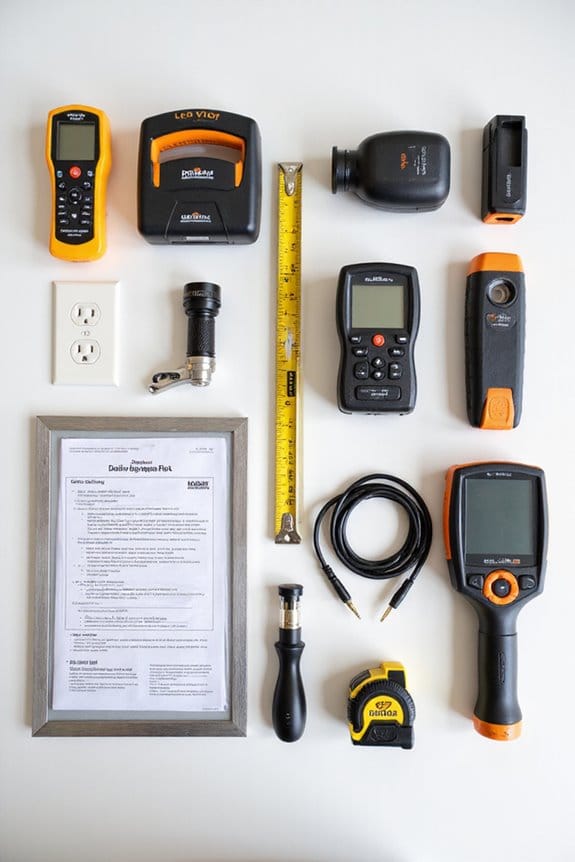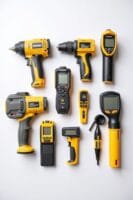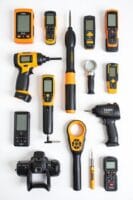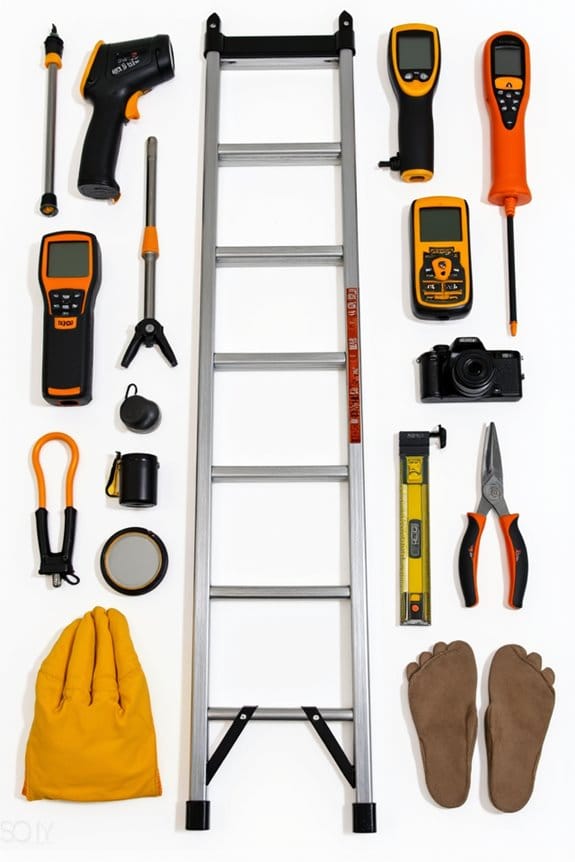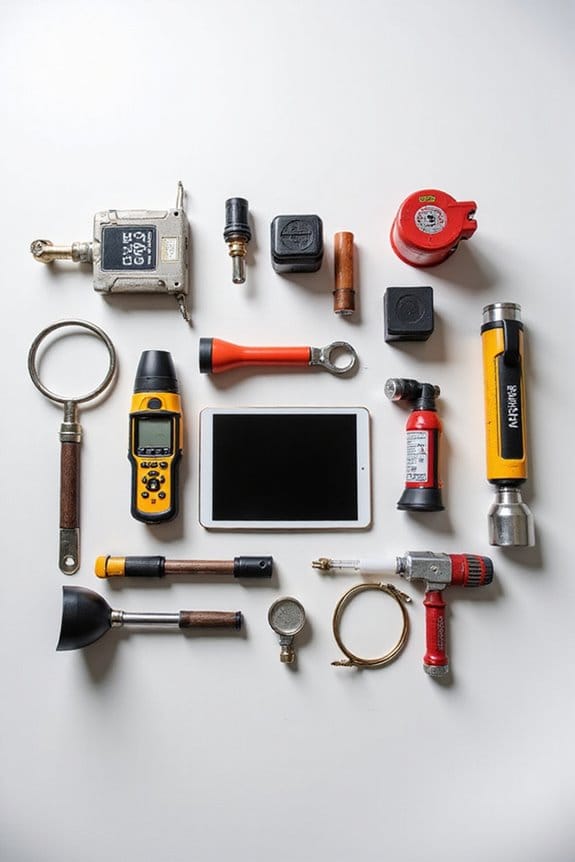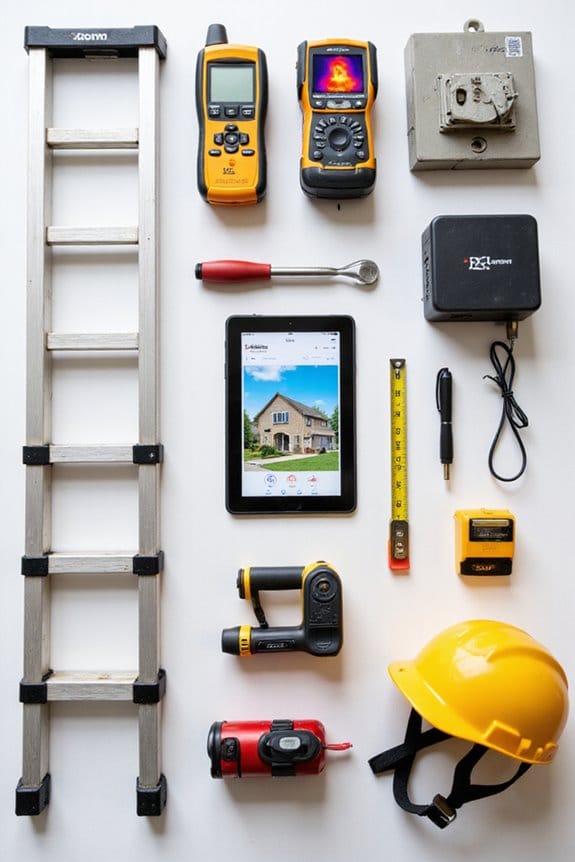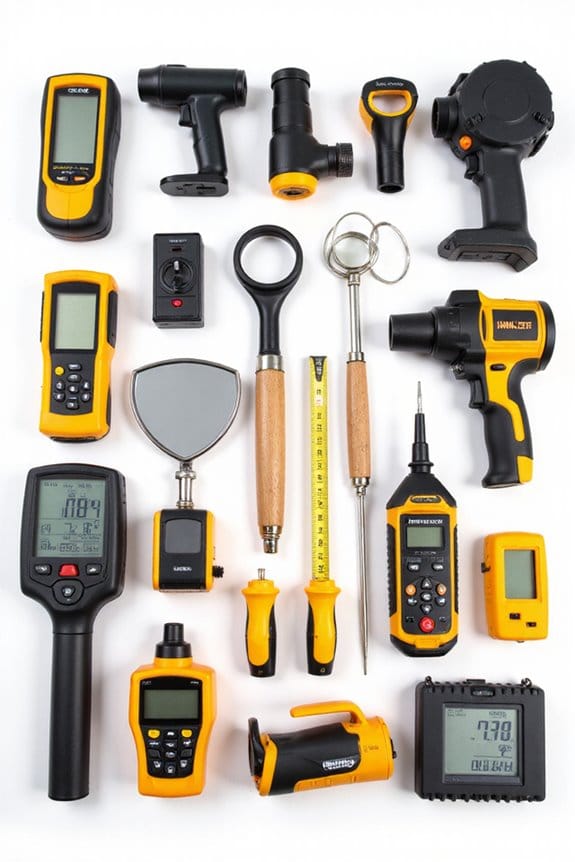When hiring a home inspector, I’ve found it helpful to ask specific questions. Here are some of my go-tos: 1) Are you licensed and certified? 2) What’s your inspection process like? 3) Can you point out major concerns I should be aware of? 4) What potential repair costs should I anticipate? And don’t forget—5) How will I receive your report? Asking these will set you up for success. Stick around, and you’ll discover more essential tips!
Key Takeaways
- Ask if the inspector is licensed and has certifications from recognized organizations like InterNACHI or NHIE.
- Inquire about the specific systems and areas that will be inspected during the assessment.
- Confirm the inspector’s experience and background in conducting home inspections.
- Discuss potential repair costs for major issues identified during the inspection.
- Ask about the process for follow-up questions or assessments after receiving the inspection report.
Credentials and Qualifications of the Home Inspector
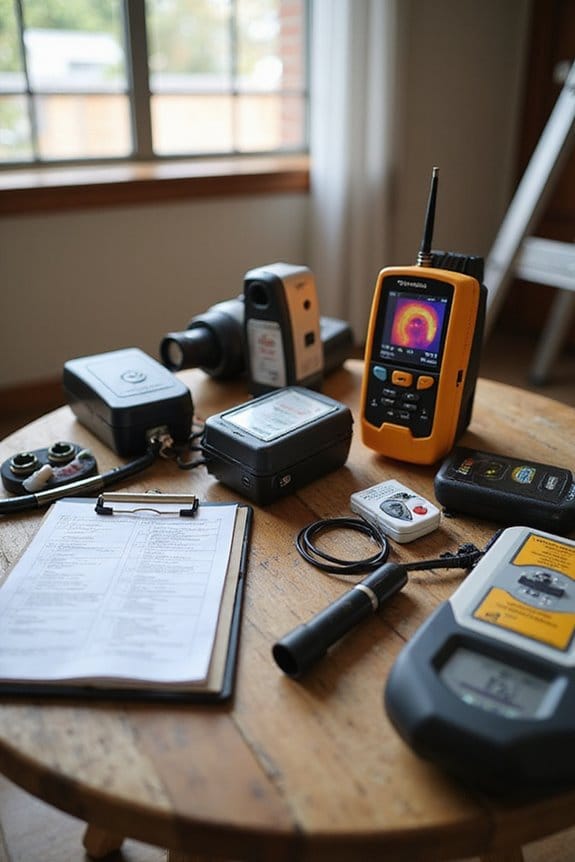
When it comes to hiring a home inspector, how can you be sure you’re making the right choice? First off, credential verification is key. Here’s what to check:
- Licensing: Is the inspector licensed in your state? In Colorado, it’s not required, but it’s still worth asking.
- Certifications: Look for certifications like InterNACHI or NHIE. These show they’ve undergone professional training.
- Ongoing Education: Ask if they keep updated with industry standards through continuing education.
- Association Memberships: Membership in recognized organizations can indicate professionalism.
Scope and Process of the Home Inspection
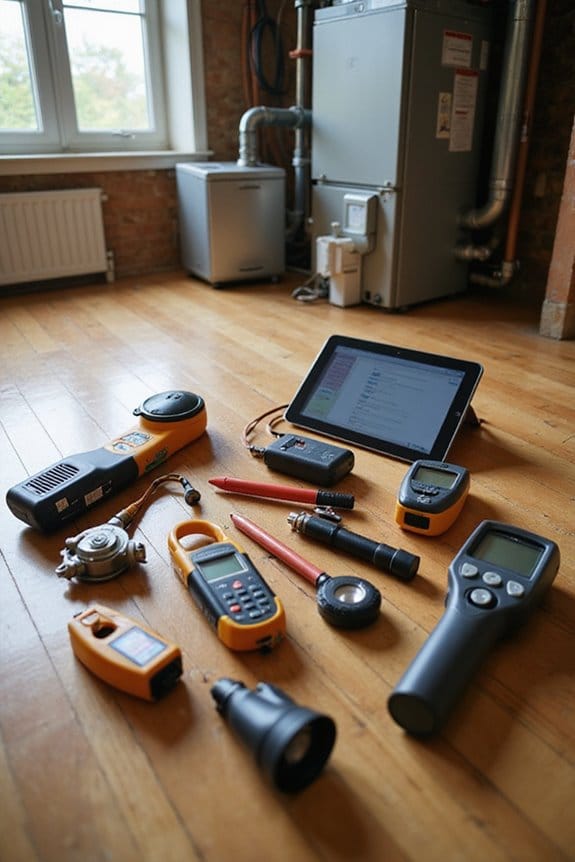
Have you ever wondered what goes into a home inspection? Understanding the inspection scope gives you insight into what the inspector will cover. Here’s a quick breakdown:
- Major Systems: Roofing, plumbing, electrical, HVAC, structure, and foundation.
- Visible Areas: Site/grounds, exterior, insulation, ventilation, and fireplaces.
- Evaluation Process: The inspector performs a visual, non-invasive assessment, focusing on observable issues without disassembling anything.
Before the inspection, you’ll sign a Pre-Inspection Agreement, which outlines everything. You can even modify the scope or request certain areas be excluded. This helps tailor the inspection to your needs. Remember, the goal is to identify defects and prioritize your home’s condition—not to stress you out!
Condition and Maintenance Questions During Inspection
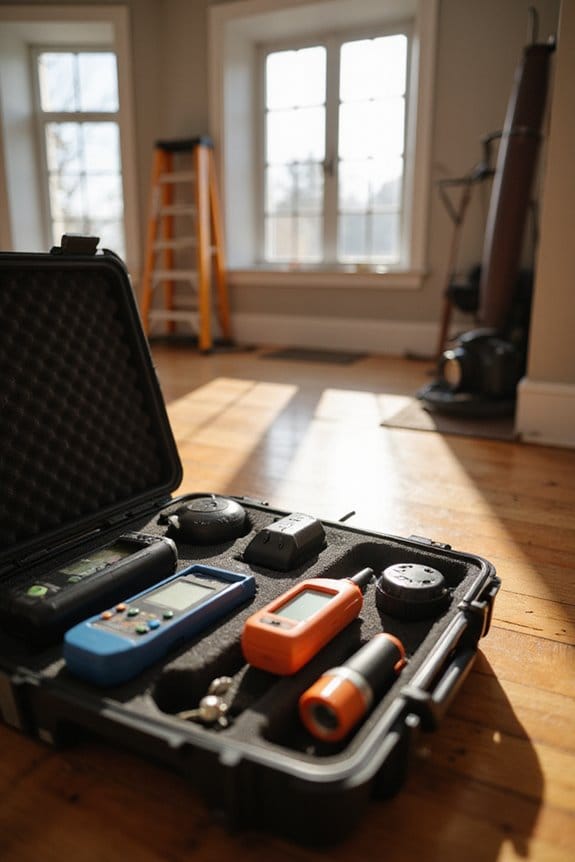
After you’ve got a solid grasp of what the inspection covers, it’s time to think about the condition and maintenance of several key areas in your prospective home. Here are a few plumbing questions I suggest asking:
- Are there any visible leaks under sinks or around fixtures? This can save you from future mold and water damage.
- Is the water pressure adequate at all taps? Proper flow means better functionality.
- How’s the condition of the water heater? You don’t want to be surprised by a cold shower!
- Are there any structural concerns with the foundation or roof? Cracks or sagging could lead to big problems later on.
- Have the leak detection tools been used to assess potential plumbing issues? These can help identify hidden leaks before they become serious problems.
These inquiries can help you understand what you’re getting into. Trust me, it’s worth it!
Potential Repair and Cost Implications
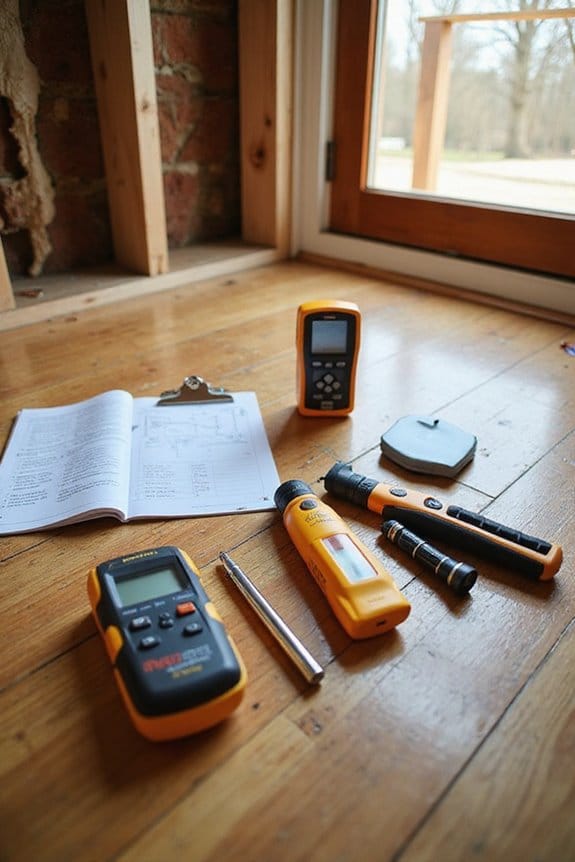
What potential repair costs should you be aware of before signing on the dotted line? First, get a grasp on major repairs. For instance, roof replacements can run about $10,000, while HVAC issues may hit nearly $6,000. I recommend asking your inspector about the frequency of these problems in homes like yours.
- Repair Prioritization: Identify urgent repairs versus those you can defer. Some repairs, like door adjustments, might hint at deeper foundation issues.
- Cost Negotiation: Knowing the average costs of repairs—like $248 for electrical fixes—can help you negotiate better terms with the seller.
Always be prepared to ask about warranties, too. They can save you a lot of headaches down the road!
Preparation and Expectations
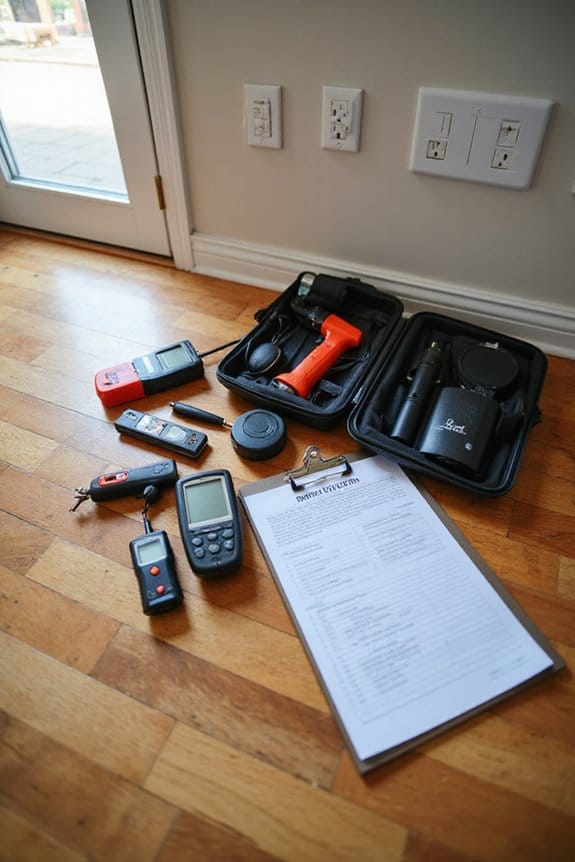
Getting ready for a home inspection can feel a bit intimidating, but it doesn’t have to be. Here’s a simple checklist to help you prepare:
- Access: Guarantee the inspector can get to the attic, basement, and crawl spaces.
- Utilities: Turn on utilities like electricity, water, and gas.
- Appliances: Make certain household appliances are operational for testing.
- Documentation: Gather maintenance records for the inspector’s review.
As for expectations, don’t hesitate to follow the inspector around and ask questions. Understanding the inspection process and the findings will help you feel more at ease. With a little preparation, you’ll be ready to tackle any surprises that come your way. Happy inspecting!
Specific Considerations for Certain Property Types
When it comes to home inspections, the type of property you’re dealing with can greatly affect what to look for and ask about. Here are some specific considerations:
- Historic Properties: Ask about structural issues like foundation settling, hazardous materials, and the condition of original systems. It’s also smart to verify if any prior restorations meet preservation standards.
- New Construction: Confirm that framing complies with modern codes and inquire about warranties on major systems. Don’t forget to check that all permits were obtained and that the inspector knows the ins and outs of new builds.
Inspector’s Communication and Reporting Style
How can a home inspector’s communication style make or break your experience? Well, let me break it down for you:
- Communication Clarity: Inspectors should use clear, jargon-free language. It’s key to understanding what’s going on with your potential new home.
- Report Structure: Look for reports that are well-organized with headings and bullet points. Trust me, you’ll appreciate a concise format that highlights important issues without drowning you in details.
- Visual Aids: Photos and illustrations can really help clarify findings. Seeing a problem is often more impactful than reading about it.
- Real-Time Interaction: If you’re present during the inspection, ask questions! Direct clarification can improve your understanding and reduce any confusion.
A good inspector will make sure you really grasp the situation!
Follow-Up and Support After the Inspection
After the inspection wraps up, it’s essential to know what steps to take next. First, I recommend carefully reviewing the inspection report. Make a list of follow-up questions for your inspector. Most inspectors are happy to clarify findings, so don’t hesitate to reach out.
Second, prioritize repairs based on safety and functionality. Focus on significant issues first, and categorize them into immediate, short-term, and long-term needs.
Lastly, check on your inspector’s availability for any follow-up visits. If you need further assessments, like plumbing or electrical checks, schedule those quickly to keep your timeline on track. Remember, clear communication is key to maneuvering this process smoothly—think of it as a team effort!
Frequently Asked Questions
How Do You Handle Conflicts of Interest During Inspections?
When I face conflicts of interest during inspections, I prioritize conflict resolution and strict inspection ethics. I disclose any potential issues upfront and guarantee my assessments remain unbiased to protect my clients’ interests.
What Tools and Technology Do You Use During Inspections?
During inspections, I rely on various inspection tools and technology advancements. I use moisture meters, infrared cameras, and electrical testers, ensuring I accurately assess a home’s condition while documenting findings efficiently for my clients.
Can You Provide a Sample Inspection Report?
Finding a good inspection report’s like discovering a treasure map. I can share inspection report examples with detailed explanations, highlighting key findings, defects, and recommendations—helping you understand the home’s condition and make informed decisions.
How Do You Approach Inspections in Extreme Weather Conditions?
When I approach inspections in extreme weather, I prioritize inspection safety precautions and follow established extreme weather protocols. I assess interiors first, use specialized equipment, and always guarantee my safety while maintaining thoroughness in challenging conditions.
What Is Your Policy on Re-Inspections After Repairs?
While I appreciate timely repairs, I charge modest re-inspection fees to guarantee quality. It’s essential to adhere to repair timelines; without them, we risk overlooking significant issues that could affect your purchase.

